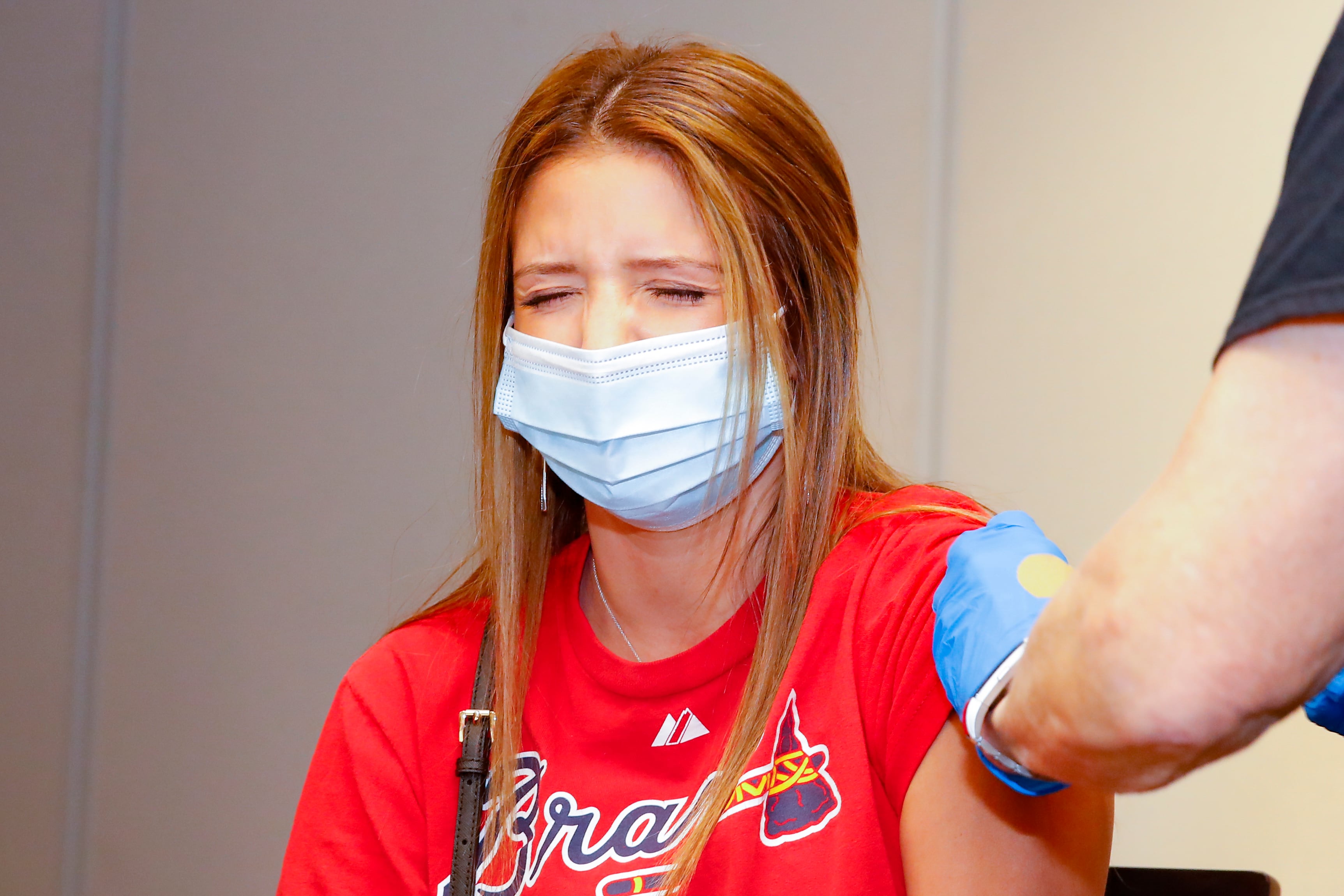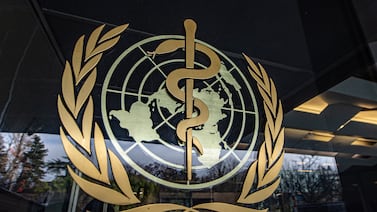Public health, explained: Sign up to receive Healthbeat’s free Atlanta newsletter here.
As the United States heads toward a new summer record for Covid cases, rates in Georgia are “very high,” with related deaths and hospitalizations on the rise.
The surge comes as updated Covid vaccines were approved Thursday and granted emergency use authorization by the Food and Drug Administration.
The shots are expected to be available as soon as next week, said Jodie Guest, senior vice chair of the Department of Epidemiology at Emory University’s Rollins School of Public Health.
“It appears that we’re about to hit a new summer record for Covid [nationally], and so we are seeing currently the biggest summer wave since July of 2022,” Guest said.
While state-specific information about the rates of positive test results is not available, regionally, nearly 17% of tests reported in the Southeast are positive, more than three times the ideal of 5% or less, Guest said. “We want to be below 5% if we have some control over the outbreak.”
But those positivity rates don’t give the full picture, since many people are now testing for the virus at home and not reporting results, Guest said.
More reliable is wastewater surveillance data, which shows that Georgia’s Covid virus level is “very high,” with viral activity greater than 8, while less than 1.5 is considered “minimal,” according to the U.S. Centers for Disease Control and Prevention.
Georgia’s wastewater virus levels – measured against a baseline formula – were twice as high for the week of Aug. 10 as the same week last year, according to CDC data. It measured 9.18 as of Aug. 10, compared to 4.47 for the same week last year. Levels have been increasing over the summer.
A state government epidemiologist said the summer Covid bump was expected, given a seasonal increase in travel and people congregating indoors to escape the heat.
“This is a pretty typical pattern that we have been seeing each of the summers since Covid emerged,” said Dr. Cherie Drenzek of the Georgia Department of Public Health.
Death and hospitalization rates are also increasing, Drenzek said, though the increases are “not at a very high level.” Just over 2% of deaths in Georgia were caused by Covid in the week leading up to Aug. 10, according to the CDC.
What to do if you test positive for Covid
People who test positive for Covid should take a two-pronged approach to recover and avoid spreading the virus, starting with staying home while sick.
The CDC recommends resuming normal activities if symptoms are improving and you have been fever-free, without fever-reducing medications, for at least 24 hours.
After that, the CDC urges people to take preventative measures for the next five days, including physically distancing from others, masking, improving air purification, and testing when around other people indoors.
Other health experts recommend isolating until you test negative for Covid, which could be three to 15 days.
“Although many have fallen to Covid fatigue, it is important to remember to test if symptoms arise and speak with your provider about treatment options,” said Dr. Danny Branstetter, medical director of infection prevention for Wellstar Health System.
Guest said parents may need to test their children twice to accurately determine whether they have Covid.
A single at-home (antigen) test cannot rule out Covid, Guest said, but false negatives are less likely when a second test is given 48 hours later.
That’s a result of how the at-home tests work, since they’re more likely to give false negatives, and the timing of the testing, because testing early on can result in a negative even when someone is infected with Covid, Guest said.
No widespread guidelines encourage people to mask up in public places, Drenzek said, but it’s good “respiratory etiquette” for those who have symptoms.
“If you’ve been recently sick and had a positive Covid test, then you should really be masking for a period of at least five days after … your respiratory symptoms improve and you have no fever,” said Dr. Harry Heiman, a clinical professor at Georgia State University’s School of Public Health.
“That’s just really a respectful and appropriate way to behave, in terms of not giving it to other people around you,” he said.
Death rate ‘much higher than it should be’
The increase in Covid-related hospitalizations and deaths is frustrating to public health experts, who contend that severe outcomes are largely preventable through widespread Covid vaccination.
“The death rate is going up” in Georgia, Guest said. “It is lower than 2020 … but it is much higher than it should be.”
About 2.4% of all deaths in Georgia for the week leading up to Aug. 10 were caused by Covid, and that number was up over the previous week, according to CDC data.
Guest said Georgia’s Covid death rate should be close to zero, since deaths are largely preventable with vaccination. “This is a vaccine preventable death for almost every case … At a minimum, we’d want to see it under 1%.”
Vaccine uptake in Georgia has been low.
As of this spring, only about 10% or 11% of Georgians are fully boosted, Heiman said. That means about 9 in 10 Georgians “are not protected in the way they should be.”
“We continue to squander the tools that we have to prevent [serious outcomes] … I’m talking first and foremost about vaccination,” Heiman said.
He gave several reasons for the low vaccine uptake rate in Georgia, including a high rate of uninsured people — nearly 12% of the population, or about 1.2 million people, are uninsured, according to KFF’s State Health Facts — as well as “a failure of both our health care and our public health systems to do active outreach to patients and to communities” to ensure people understand the “critical importance” of vaccines.
Atlanta health systems seeing more cases
Metro Atlanta health systems said they are seeing more Covid cases among patients.
“The total number of inpatients with Covid-19 has increased, but the severity of cases has not worsened,” said Danielle Hackett, a spokesperson for Grady Health System. Many patients admitted to the hospital for non-Covid reasons are found to have Covid.
The number of children with Covid at a large local pediatric health system is also increasing.
“Children’s Healthcare of Atlanta has seen an increase in the number of children with Covid-19, especially over the past three weeks. Approximately one-quarter of our respiratory virus tests across our system have detected [Covid],” said Dr. Andi Shane, division chief of pediatric infectious diseases at Children’s Healthcare of Atlanta.
“Most of the children who test positive have mild illness, but we have cared for some children who have other medical conditions who have had more severe illness,” Shane said.
New vaccines on the way
The rising Covid rates come as new vaccinations are expected to be available as soon as next week.
“It will have great coverage for the vaccines or for the variants that we currently see circulating,” Guest said.
Epidemiologists and doctors recommend the new vaccines for everyone 6 months and older.
“Vaccination of children not only helps to protect them but also indirectly protects other people, including young babies under 6 months of age, who cannot be vaccinated, and grandparents, whose immune systems may not work as well,” Shane said.
People who have already been vaccinated need only wait four months between the last vaccine and this new one, Guest said. “Many people got theirs last fall, so most will be eligible right away.”
Rebecca Grapevine is a reporter covering public health in Atlanta for Healthbeat. Contact Rebecca at rgrapevine@healthbeat.org.







